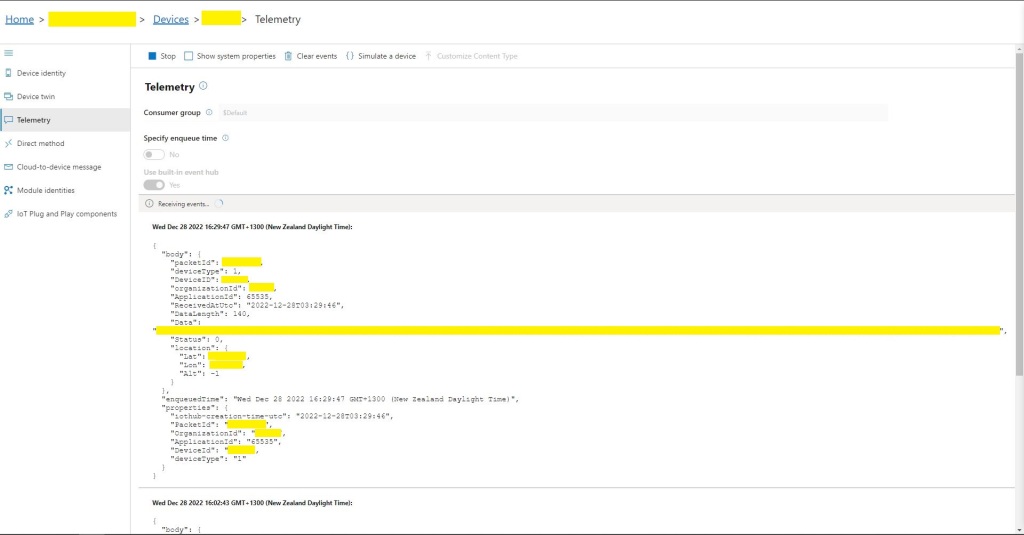The payload formatters of my Azure IoT Hub Cloud Identity Translation Gateway use CS-Script and even a simple one was taking more than half a second to compile each time it was called.
using System;
using System.Globalization;
using Newtonsoft.Json.Linq;
public class FormatterUplink : PayloadFormatter.IFormatterUplink
{
public JObject Evaluate(JObject telemetryEvent, string payloadBase64, byte[] payloadBytes, string payloadText, JObject payloadJson)
{
if ((payloadText != "" ) && ( payloadJson != null))
{
JObject location = new JObject();
location.Add("lat", payloadJson.GetValue("lt"));
location.Add("lon", payloadJson.GetValue("ln"));
location.Add("alt", payloadJson.GetValue("a"));
telemetryEvent.Add("Location", location);
};
return telemetryEvent;
}
}
The Swarm Eval Kit default message has a userApplicationId of 65335
{"ln":123.456,"si":0.0,"bi":0.2,"sv":0.152,"lt":-12.345,"bv":4.032,"d":1671704370,"n":2,"a":9.0,"s":1.0,"c":208.0,"r":-94,"ti":0.032}
The 65355.cs payload formatter adds an Azure IoT Central compatible location to the telemetry payload.
The formatter files are currently part of the SwarmSpaceAzureIoTConnector project (moving to Azure Blob Storage) so are configured as “content” (bonus syntax highlighting works) and “copy if newer” so they are included in the deployment package.
I used Alastair Crabtrees’s LazyCache to store compiled payload formatters with Uplink/Downlink + UserApplicationId as the cache key.
public class FormatterCache : IFormatterCache
{
private readonly ILogger<FormatterCache> _logger;
private readonly Models.ApplicationSettings _applicationSettings;
private readonly static IAppCache _payloadFormatters = new CachingService();
public FormatterCache(ILogger<FormatterCache>logger, IOptions<Models.ApplicationSettings> applicationSettings)
{
_logger = logger;
_applicationSettings = applicationSettings.Value;
}
public async Task<IFormatterUplink> UplinkGetAsync(int userApplicationId)
{
IFormatterUplink payloadFormatterUplink = await _payloadFormatters.GetOrAddAsync<PayloadFormatter.IFormatterUplink>($"U{userApplicationId}", (ICacheEntry x) => UplinkLoadAsync(userApplicationId), memoryCacheEntryOptions);
return payloadFormatterUplink;
}
private async Task<IFormatterUplink> UplinkLoadAsync(int userApplicationId)
{
string payloadformatterFilePath = $"{_applicationSettings.PayloadFormattersUplinkFilePath}\\{userApplicationId}.cs";
if (!File.Exists(payloadformatterFilePath))
{
_logger.LogInformation("PayloadFormatterUplink- UserApplicationId:{0} PayloadFormatterPath:{1} not found using default:{2}", userApplicationId, payloadformatterFilePath, _applicationSettings.PayloadFormatterUplinkDefault);
return CSScript.Evaluator.LoadFile<PayloadFormatter.IFormatterUplink>(_applicationSettings.PayloadFormatterUplinkDefault);
}
_logger.LogInformation("PayloadFormatterUplink- UserApplicationId:{0} loading PayloadFormatterPath:{1}", userApplicationId, payloadformatterFilePath);
return CSScript.Evaluator.LoadFile<PayloadFormatter.IFormatterUplink>(payloadformatterFilePath);
}
...
}
The default uplink and downlink formatters are configured in application settings and are used when a UserApplicationId specific formatter is not configured.


